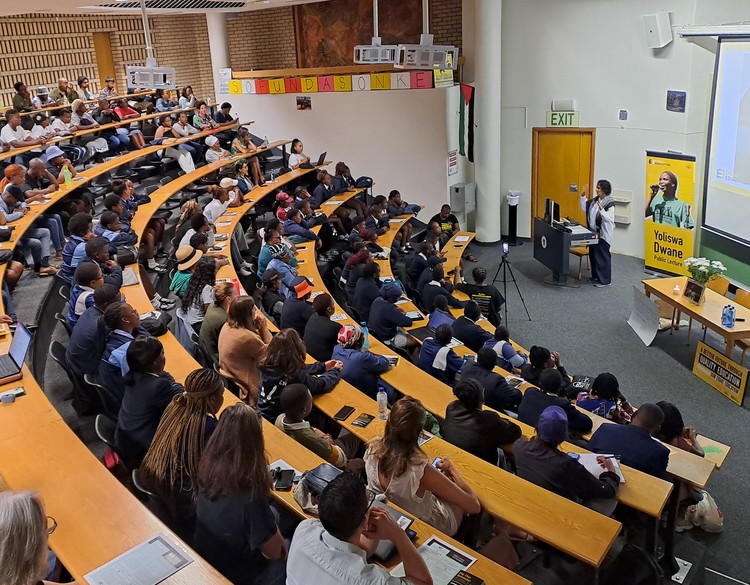Yoliswa Dwane, education activist who condemned John Hlophe, is remembered at UCT event
She “dedicated her life to advancing social justice” but died “too young, too early”
Over 100 people gathered at the UCT Kramer building for the second annual Yoliswa Dwane lecture, commemorating the co-founder of Equal Education’s life. Photo: Liezl Human
Late activist Yoliswa Dwane’s fight against inequality in South Africa was celebrated at the second public lecture in her name on Friday. More than 100 people gathered at the University of Cape Town for the lecture held in memory of Dwane who was Equal Education’s co-founder. She died of cancer at the age of 40 on 21 October 2022.
The lecture was hosted by Equal Education, a social movement for education rights, and the Centre for Law and Society.
Last month was a bittersweet one for Dwane’s memory when John Hlophe became the first person to be removed as a judge in South Africa. Nearly fifteen years ago Dwane wrote in the Times:
“Judge John Hlophe is the wrong man for the chief justice job – and treating race as his chief qualification won’t fix that.”
“The Hlophe campaign, which previously presented itself as an attempt to protect Judge Hlophe from supposed victimisation, is now a blatant attempt to see him promoted,” she wrote. “… Judge Hlophe does not hesitate to use our fears of racism and discrimination to get ahead. He has very little in common with the majority of people in this country — the black working class. Ordinary people don’t drive luxurious cars and can’t afford Judge Hlophe’s hobbies of winemaking and hunting.”
Nurina Ally, a senior lecturer at the UCT law department, said that Dwane “dedicated her life to advancing social justice” and that she died “too young, too early”. Dwane graduated from UCT with a degree in film and media studies and then completed her law degree.
The keynote lecture was delivered by Fatima Hassan, the director of the Health Justice Initiative (HJI). Hassan spoke about the connection between poverty, health inequality, and Dwane’s role in fighting inequality by establishing the Equal Education Law Centre.
“She had no illusions about the power of the law and its rule,” said Hassan. She said Dwane understood the need for a legal arm in Equal Education to give “a legal voice to its mass mobilisation and vice versa”.
Hassan said inequality has grown in the last decade in South Africa. “Poverty in our country is so high. We know it, we see it everyday.”
She added that poverty affects black women and children more in the country. “Especially in a democracy, inequality must be challenged,” she said.
She also said that the lecture “[came] at a very disheartening time” because of what was happening in Gaza. She said Dwane would have been at the forefront of the action against the war in Gaza and Palestine.
Hassan added that government spending on health has continued to decline in real terms. She said that black learners in South Africa are still disadvantaged in a substandard education system.
However, Hassan said that this doesn’t mean we should “despair” but rather show up, stand in solidarity, and use the Constitution as a tool. She said that Equal Education was led by “amazing young leaders”, who create awareness and use politics and the law to tell everyone about social injustice.
Support independent journalism
Donate using Payfast

Next: SAPS and Public Works called to Parliament over Telkom Towers debacle
Previous: Cape Town Pride celebrates equality in South Africa, condemns Ghana’s new anti-gay law
© 2024 GroundUp. This article is licensed under a Creative Commons Attribution-NoDerivatives 4.0 International License.
You may republish this article, so long as you credit the authors and GroundUp, and do not change the text. Please include a link back to the original article.
We put an invisible pixel in the article so that we can count traffic to republishers. All analytics tools are solely on our servers. We do not give our logs to any third party. Logs are deleted after two weeks. We do not use any IP address identifying information except to count regional traffic. We are solely interested in counting hits, not tracking users. If you republish, please do not delete the invisible pixel.

